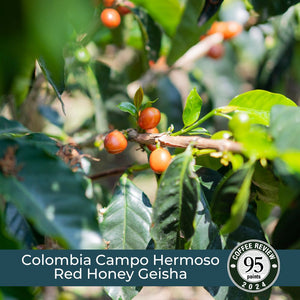Ethiopia Gesha Village Surma 1931 Mossto Anaerobic Honey Transparency Report

CUPPING NOTES:
Watermelon, Strawberry, Red Apple, Delicate Spices
DESCRIPTION:
The Gesha Village Coffee Estate was established in 2007 in the far western part of Ethiopia, near the South Sudanese border, within the West Omo zone. The 471-hectare farm was built with a passion for producing high-quality coffee by Rachel Samuel, Adam Overton and Willem Boot, with the help of the local Meanit peoples who are the inhabitants and protectors of Gesha.
The founders chose the land in West Omo for its ideal coffee-growing conditions and close proximity to the Gori Gesha forest, the birthplace of the famed Gesha variety. They harvested wild Gesha seeds and developed the land into a world-class coffee farm, contributing to the revival of the local coffee industry. Their efforts have helped bring Western Ethiopia into the global specialty-coffee market, with a focus on innovation and community.
This E-20 lot is part of the Rarities Collection which represents 10% of the total production on the farm. The Rarities Collection coffees are the top scoring lots that Gesha Village produces (outside of auction lots), and they are frequently chosen for competition by internationally competing baristas.
The Gesha Village Estate is divided into eight “blocks” which are individually monitored and managed, specifically for the needs and profiles of the coffee grown and to maintain traceability down to the specific area that the coffee cherries are picked from.
This lot of Gesha 1931 was grown on the Surma Block, named after the local Surma ethnic group who inhabit the nearby lowlands, visible from the hills in the Surma block that overlook the valley below and reach up to nearly 2100 meters. Surma has a tendency to have soft floral notes of jasmine and rose as well as notes of strawberry, watermelon, red apple and delicate spice.
The original gesha seeds were gathered from the Gori Gesha coffee forest, located 20 kilometers from the farm. Through historic expedition research and genetic testing, this location in Gori Gesha has been determined to be the collection site of the Panamanian Geisha.
This “Gesha 1931” variety is a selection made from the diverse forest population that closely resembles the Panamanian Geisha. This selection was made by looking at the plant morphology, bean shape and size, as well as its cup profile.
Bahilu Tamirat oversees production and quality control at Gesha Village. In this sequential honey process, cherries are washed and soaked in water for 2 hours and then pulped leaving the maximum amount of mucilage intact. The mucilage-covered coffee is added to an anaerobic environment with coffee “mossto”, or must, and fermented for 16 hours before being removed and dried in sun for 3 days and then moved to finish drying under shade.
Gesha Village Coffee Estate focuses on sustainability through community development, environmental conservation, and eco-friendly practices.
They built the area's first high school and host annual workshops for farmers to share knowledge. Environmental sustainability efforts include planting native trees in deforested land and maintaining biodiversity within the farm. Water-saving coffee processing methods are implemented and waste is treated or composted to be used again. Additionally, Gesha Village has launched a beekeeping program to produce honey and support pollination on the farm. Their initiatives reflect a strong commitment to both the community and the environment.
COFFEE INFORMATION
| Origin | Ethiopia |
| Variety | Surma 1931 Gesha |
| Process | Mossto Anaerobic Honey |
| Farmer / Producer | Adam Overton, Rachel Samuel |
| Region | West Omo Zone, Southwest Ethiopia Peoples' Regional State |
| Washing Station Owner | NA |
| Station | NA |
| Drying Practices | Raised African Beds |
| Elevation (MASL) | 1909 |
| Origin Cup Score | 88.25 |
Farmer-first Information
We take a farmer-first approach when sourcing our coffee, recognizing that the best coffee often comes from family-owned farms. Our commitment ensures that farmers are fairly compensated for producing the highest quality coffee. Our approach goes beyond coffee; it's about empowering farmers and their families to thrive.
- Farmer/Producer Relationship Length with BLCC: 1 years
- Farm Gate (price paid to farmer): $9.00 (per lb)
- New York Arabica Coffee Price (I:NYACP): $2.19 (per lb)
- Percent above C-Market: 410%
Facts about Coffee Farms across the world
It's a fact that the world's coffee comes from families, not big corporations. Every bag of coffee that we deliver to you comes directly from these incredible coffee-producing families. Their dedication to their craft and commitment to sustainable practices truly make every sip of our coffee a unique experience. This is the ethos that drives us every single day.



































